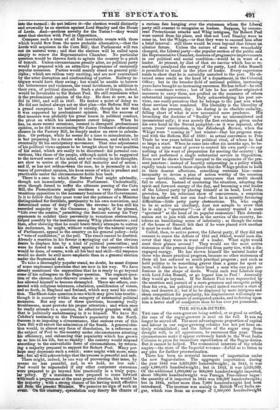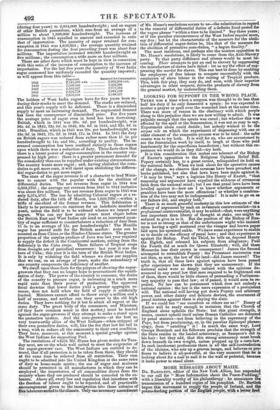THE SUGAR-DUTIES.
THE case of the corn-growers being settled, or as good as settled, the case of the sugar-growers is next on the roll. It can no longer be staved off. The most advantageous proportion of capital and labour in our sugar-growing colonies has not, yet been en- tirely reestablished; and the failure of the sugar crop from drought will, to all appearance, be enormous this year. These circumstances make it appear extremely harsh to the year. India Colonies to press for immediate equalization of the Sugar-duties. But it cannot be helped. The economical interests of the whole empire—the state of the Imperial revenue—forbid us to listen to any plea for further procrastination.
There has been no material increase of importation under the new Sugar-duties. The aggregate importation during the year 1845 was 5,820,890 hundredweight; in 1844, it was only 4,880,075 hundredweight ; but in 1843, it was 5,020,569. Of the additional 1,000,000 or 800,000 hundredweight imported, about 160,000 hundredweight was Foreign Free-labour sugar : the quantity of it imported in 1845 was 168,607 hundredweight ; but in 1844, rather more than 7,000 hundredweight had been introduced. The increase was mainly in British West India su- gar, which rose from an average of 9,500,000 hundredweight (during four years) to 2,854,000 hundredweight ; and on sugars of other British possessions, which rose from an average of a million to about 1,336,000 hundredweight. The increase of consumption in 1845 equalled in amount and exceeded in ratio that of importation. The quantity of sugar retained for con- sumption in 1845 was 4,856,604 ; the average quantity retained for consumption during the four preceding years was about four millions. The importation increased 800,000 hundredweight on five millions ; the consumption a trifle more on four millions.
There are other facts which must be kept in view in connexion with this ratio of the increase of consumption to the increase of importation. For the last five years the quantity of West India sugar consumed has uniformly exceeded the quantity imported ; as will appear from this table—
Imported. Retained for Consumption.
1841 2,145,500 cwt. 2,992,203 cwt.
1842 2,508,910 2,932,386 1843 2,503,567 2,972,564 1844 2,452,778 3,084,139 1845 2,854,010 3,548,121
The holders of West India sugars have for five years been re- ducing their stocks to meet the demand. The stocks are reduced, and this year's supply will be deficient. There is a diminished supply to meet an increasing demand. The augmented demand has been the consequence of diminished price. For five years the average price of sugar even in bond has been decreasing. British, which in 1841 was 39s. 8d. per hundredweight, was 36s. 4d. in 1842, 33s. 9d. in 1843, 33s. 8d. in 1844, and 32s. 4d. in 1845. Brazilian, which in 1841 was 20s. per hundredweight, was 183.3d. in 1842:17s. 2d. in 1843, 17s. in 1844. In 1845 the duty on British sugars was reduced from rather more than 1/. 5s. per hundredweight to 14s. and 16s., according to quality. The in- creased consumption has been confined entirely to those sugars upon which there was a reduction of duty. These facts show that there is a latent power of sugar-consumption in the country sup- pressed by high price : there is a greater permanent demand for the commodity than can be supplied under existing circumstances. The country wants more sugar ; and, having abolished the corn- duties to get more corn, it will insist upon abolishing the differen- tial sugar-duties to get more sugar.
The state of the sugar revenue is of a character to lead Minis- ters to concur with the popular wish for the abolition of differential duties. The net revenue from sugar in 1844 was 5,203,270/. ; the average net revenue from 1841 to 1844 inclusive was about lye millions. The net revenue from sugar in 1845 was Only 8,574,471/. The loss by admitting Colonial sugars at a re- duced duty, after the 14th of March, was 1,628,7991.—within a trifle of one-third of the former revenue. This defalcation is likely to be permanent—to continue for an indefinite number of years, unless the field is to be widened whence we import our sugars. Who can say how many years must elapse before the British East and West Indies can send us an increased quan- tity of sugar sufficient to counterbalance a reduction of duty from 11. 5s. to an average of 15s. per hundredweight ? The Manilla sugar has proved unfit for the British market : none can be counted on from China or the Hindoo-Chinese states. The greater proportion of the surplus produce of Java was last year required to supply the deficit in the Continental markets, arising from the deficiency in the Cuba crops. These failures of Tropical crops from drought are of periodical recurrence : last year it was the turn of Cuba; this year it is the turn of the British West Indies. It is only by widening the field whence we draw our supplies that we can, on an average of years, make the redundancy of one country compensate the deficiency of another. We dwell upon these facts for the purpose of showing the sugar- growers that they can no longer hope to procrastinate the equali- zation of duty. The power of the country to consume, the desire of the country to procure sugar, is increasing in a much more rapid ratio than their power of production. The approved fiscal doctrine that lower duties yield a greater aggregate re- venue, does not hold when the held of supply is artificially limited. Ministers cannot afford to throw away a million and a half of revenue, and neither can they revert to the old high duties. They have nothing for it but to admit all sugars at the same duty. The great body of the consumers, and Ministers, (if they have common sense in this matter,) must be banded against the sugar-growers if they attempt to make a stand upon the protective system. And the corn-growers—at the best no very trustworthy allies of the West Indians—when stripped of their own protective duties, will, like the fox that lost his tail in a trap, wish to reduce all the community to their own condition. They have, moreover, at this moment a special grudge against the West Indians for supporting Peel. The resolutions of which Mr. Hume has given notice for Tues- day next, are on the whole well suited to meet the exigencies of the sugar-growers' case. The West Indians are entitled to de- mand, that if all protection is to be taken from them, they should at the same time be relieved from all restriction. Their rum ought to be admitted into the United Kingdom at the same rates of' duty as home-made spirits ; the use of sugar and molasses Should be permitted in all manufactures in which they can be employed ; the importation of all commodities direct from the country where they are produced should be conceded to the co- lonists. Above all, every law and regulation that interferes with the freedom of labour ought to be repealed, and all practicable ericouragement given to the immigration into these colonies of free labourers suited to the climate. Only one necessary amendment
of Mr. Hume's resolutions occurs to us—the substitution in regard to the removal of differential duties of a definite fixed period for the vague phrase "within a time to be limited" Say three years ; or if the peculiar circumstances of the West Indies require more, say five : but let the characteristic of the measure for the aboli, tiou of differential sugar-duties be, like that of the measure for the abolition of protective corn-duties, " a begun finality." The most insidious, and perhaps also the noisiest opposition to Mr. Hume's resolutions, is likely to come from the Anti-Slavery party. To that party diffidence and silence would be most be- coming. Their attempts to put an end to slavery by suppressing the manufacture of slaves have failed : let us try the effect of sup- pressing the market for slaves. This can best be done by enabling the employers of free labour to compete successfully with the employers of slave labour in the raising of Tropical produce. This, with fair play, they may do, and soon, with their superior advantages in other respects, drive the products of slavery from the general market, by underselling them.



























 Previous page
Previous page